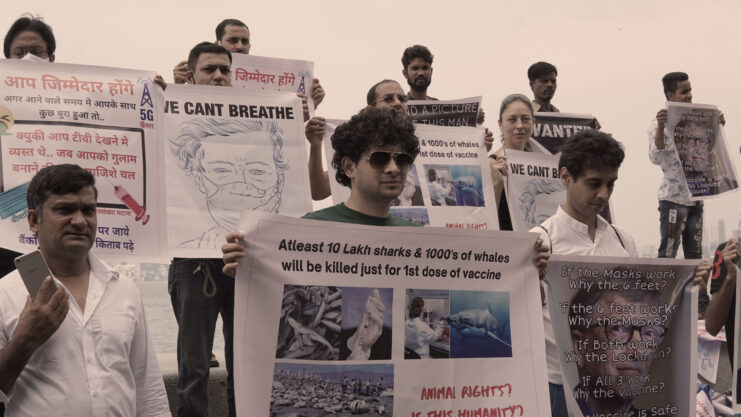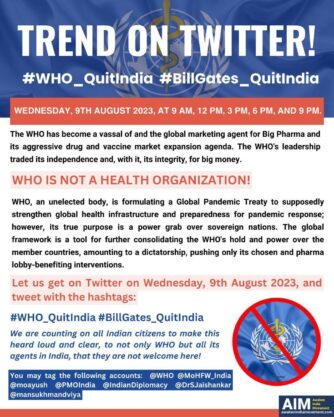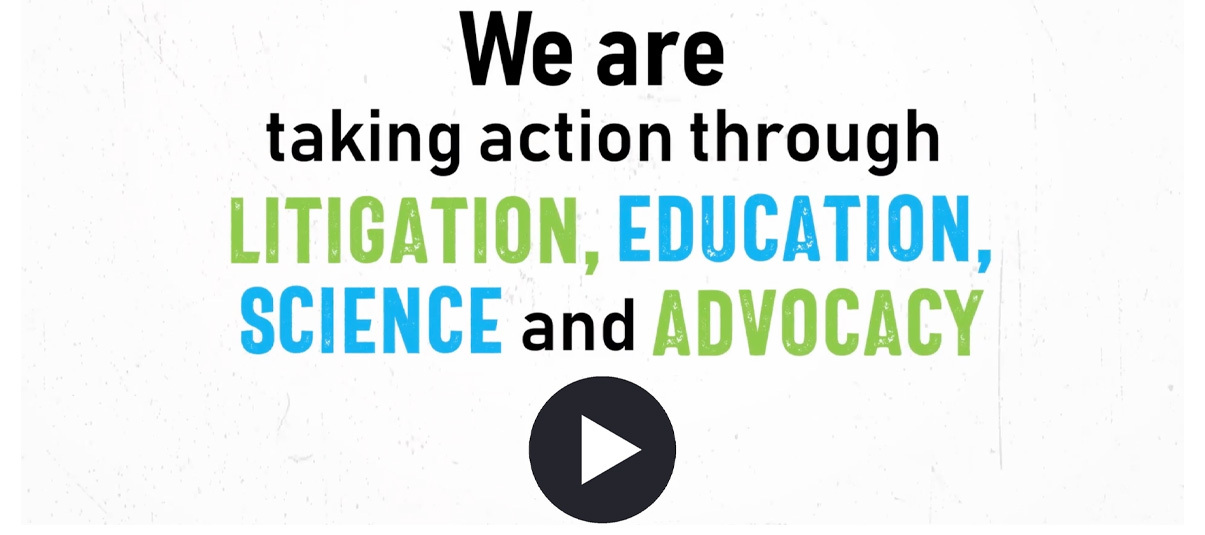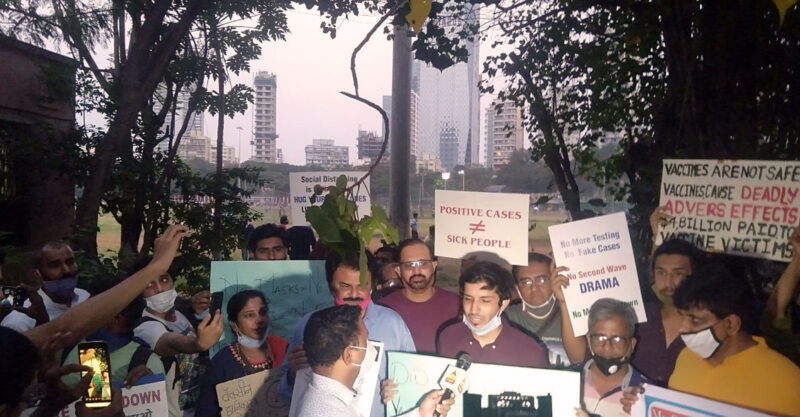EXIT THE WHO: AWAKEN INDIA MOVEMENT’S POWERFUL POSITION PAPER
Written by: Shabnam Palesa Mohamed
The well known grassroots health freedom advocacy group Awaken India Movement just released a powerful position paper on why India should quit the WHO. The paper is well-reasoned, well-referenced and is a compelling read for all countries around the world to consider. Momentum on the #ExitTheWHO campaign continues to grow and India’s role in this campaign, given its experience and size, is pivotal.
What is the Awaken India Movement?
Described on its website, the motivation is: “Covid-19 has been an unprecedented crisis facing Humanity and we have been researching different dimensions of the ‘Great Reset’ and its solutions being propagated, to uncover the underlying political and economic interests behind these decisions, their pros and cons, as well as the scientific contradictions and scientific facts that are being ignored behind these decisions. We present reliable information and resources that are accessible to those with little scientific, legal or technical knowledge, uncovering global agendas and authoritarian tactics unfolding to this end.”
AIM is described on its website: “We are an initiative of the citizens of India united in the greater pursuit of truth and justice and committed to the well-being of all. Our beliefs are guided by the laws of nature and substantiated by evidence based research that has empirical and scientific merit. We work towards drawing the attention of our fellow-citizens and policy makers to issues that have a direct bearing on the well-being of all Indians. We collaborate with like-minded individuals and organizations through creative action and are committed to values of self-responsibility, awareness, freedom of choice and basic human rights.”

The AIM’s WHO position paper released 1 August 2023
The introduction reads: “A draft of Global Pandemic Treaty is being prepared under the aegis of World Health Organisation, and was issued on 1st February, 2023. This Zero draft claims to propose mechanisms to create a global framework for the preparedness, detection, response, and recovery to future pandemics. In reality, this global framework appears to be a tool for further solidifying and consolidating WHO’s hold and power over member countries, and that amounts to a dictatorship, pushing only its chosen interventions that benefit the pharma lobby.”
“Awaken India Movement has written a Position Paper to clearly outline the problems with the Global Pandemic Treaty and to show how the WHO is not a Health Organisation. Please find a Covering Letter for the Position Paper in the link below. This letter can be given to local Politicians, bureaucrats and other health authorities. Please add your name, phone number and address in the letter before giving it to concerned authorities. Covering_Letter_to_AIM_Position_Paper_on_WHO_and_its_proposed_GlobalDownload “
“Please find below AIM Position Paper on “WHO and its Proposed Global Pandemic Treaty”. You can also download here.”
In 17 concise pages, the position paper outlines the following:
- Global Pandemic Treaty
– Purpose of the Treaty - Major Concerns on WHO Draft Global Pandemic Treaty
– Who is the WHO? Can we trust WHO?
– Four Important Concerns Regarding the WHO Draft Pandemic Treaty
– WHO’s handling of the Covid-19 Pandemic
– Is WHO in the business of manufacturing Pandemics?
– Is WHO a Health Organization in reality? - History & Key Provisions of Treaty
– History or Timeline of the Treaty Formation Process
– Stakeholders that Build a Power Lobby for the WHO, whilst leaving out the very Public Whom WHO Claims to Protect.
– Key Clauses in the Treaty
– The 5 Broad Categories of the Treaty - Awaken India Movement Commentary on the WHO proposed World Pandemic Treaty
– The proposed treaty is couched in so many promises that it does not propose a meaningful, rational pandemic management method
– Strengthening WHO Totalitarianism
– Vaccine-centric Approach needs a review, as Vaccines have now been found out to cause over a hundred different types of injuries and even Deaths
– Intellectual Property Rights IPR
– Why the “One Health” Focus is a Power Grab for WHO & Pharma Lobbies
– National Sovereignty
– India - Analysis
- Conclusion
The first two sections of the paper read as follows:
AIM Position Paper on WHO and its proposed Global Pandemic Treaty
I. Global Pandemic Treaty
1.1 A draft of Global Pandemic Treaty is being prepared under the aegis of World Health Organisation, and was issued on 1st February, 2023.
This Draft Treaty , dubbed as ‘Zero Draft’ of the WHO CA+, has 38 articles and is a 32-page long document. It was also proposed that this treaty, as an instrument of WHO, would be adopted under Article 19 of WHO Constitution and also consider the suitability of Article 21.
1.2 Purpose of the Treaty
This Zero draft claims to propose mechanisms to create a global framework for the preparedness, detection, response, and recovery to future pandemics. It claims to prevent and prepare for future pandemics, while ensuring a better coordinated response and equal access to vaccines, treatments, and diagnostics. In reality, this global framework appears to be a tool for further solidifying and consolidating WHO’s hold and power over member countries, and that amounts to a dictatorship, pushing only its chosen interventions that benefit the pharma lobby. The WHO is expecting totalitarian powers when it says “improved cooperation” and yet, the global health threats are just the ones created by WHO using false science, paid experts and paid media. Instead, the COVID-19 pandemic mismanagement highlights a greater need for evidence-based science, transparency in policy decision and respecting national sovereignty. Potential threats to global health are not the flu, but health complications that arose out of the WHO’s restrictive mandates, which it termed as ‘Covid Appropriate Behaviours’ (CAB) such as masking, testing, social distancing, lockdowns, quarantines and vaccinations. These life destroying behaviours impacted poor families across the globe, which survive on daily toiling, pushing them into a cycle of irrational fear, starvation and consequently, ill health.
II Major Concerns on WHO Draft Global Pandemic Treaty
2.1 Who is the WHO? Can we trust WHO?
The Global Pandemic Treaty draft is created by WHO (World Health Organization) that was founded in 1948. WHO relied on funding from its member states; and their contributions were assessed based on their national income and population. The funds were not earmarked for any particular policy. In those days WHO was an independent organization. But over time, the WHO leadership traded its independence
and with it, its integrity, for big money. WHO provides public health recommendations about the use of pharmacologic drugs and vaccines and provides guidelines and assistance in public health emergencies.
Currently, 80% of the WHO budget relies on earmarked donations; primarily from the U.S. government, the Bill and Melinda Gates Foundation, China and Big Pharma Companies. These major donors dictate and control the WHO policies, ensuring that WHO policies further their interests. The WHO, it should be noted, is not accountable to public scrutiny, as non-profits are. The internal documents of the WHO are not available under Freedom of Information, and most of the WHO’s financial contracts are secret. In essence, the WHO became a vassal of, and the global marketing agent for Big Pharma and its aggressive drug and vaccine market expansion agenda. Time and again, the WHO has demonstrated its allegiance to its financial backers; adopting measures that have vastly enriched Big Pharma – even as the widespread, use – and misuse – of multi-drug cocktails and multi-virus vaccines – have caused epic number of serious adverse side-effects, hospitalizations, chronic illnesses, and deaths.
On Sovereignty, the paper states:
4.6 National Sovereignty
The Global Pandemic Treaty can have a huge negative impact on Indian national sovereignty, democratic framework of governance and Rule of Law. If the treaty were to be coordinated by a trustworthy unbiased body without conflicts of interests from its donors and stakeholders and then it were to establish a framework for coordinated international action to prevent and respond to pandemics, while respecting the sovereignty of individual nations, it could be seen as a positive development. Such a treaty could help ensure that countries are better prepared to respond to a global health crisis, which ultimately benefits the health and well-being of people around the world.
However, since the WHO Pandemic Treaty includes provisions that undermine the sovereignty of individual nations, such as requiring them to cede decision-making power to the WHO, it is a threat to national sovereignty. In such a case, the treaty is bound to meet with resistance from countries that are wary of ceding any degree of control to international organizations. Since the Treaty is also created by an unelected body i.e., the WHO, which is controlled by its agenda driven donors, and has had such abysmal performance in the past, it is impossible to trust its authority and recommendations.
The Treaty has an argument that national sovereignty is not an absolute principle. This is a red flag for a power grab. In cases of pandemics, which require coordinated international action, some degree of sovereignty may need to be surrendered in order to achieve a common goal. Ultimately, the impact of a Global Pandemic Treaty on national sovereignty would depend on the details of the treaty and respecting the free choice of nations whether working together is necessary to address global health challenges. It is also important to note the process of decision-making. In WTO, decisions can be made only through consensus. Elsewhere, like in World Bank, voting rights are divided by shares and contributions. In a democratic decision-making body, equal rights and opportunities for all the parties are critical.
A Governing Body, constituted by all parties, is proposed as part of the institutional arrangements for decision-making. However, the functioning of this Governing body has been made sub-servient to the WHO Executive Board. This WHO Executive Board does not represent all parties. Procedures to be evolved for the functioning of the governing body might include ‘specified majorities required for the adoption of particular decisions.’ This will bring politics, politicking and probably give us a zero-sum game.
On Indian government’s position during Covid-19:
4.7 India
The Indian government has followed WHO directions whenever they have been conveyed. This unquestioned acceptance has been a major concern. With a treaty, this can be the legal norm and would be worrisome to the democratic atmosphere in India. Nationally, the Union Government has not utilized the mechanisms of consultation and thinking enshrined in Indian Constitution. Unlike UK Parliament, India is yet to propose a discussion on the draft treaty inside Parliament. When Covid struck in 2020, it was the duty of the Indian Government to first act quickly to protect the health of its citizen’s by forming a ‘High Level Health Experts Committee’ of the best and most senior doctors and healthcare professionals in the country from all streams of medicine such as Allopathy, Ayurveda, Yoga, Unani, Siddha, Homeopathy, Sowa Rigpa, Naturopathy, Nature Cure & Energy Medicine. They were the ones who should have been entrusted with the Covid Response
protocol instead of the Allopathy dominated National Covid Task Force that failed so miserably.
If the Indian Government had done that, not much harm would have come to Indian citizens. After all, a great nation like India with its 5000 year old Ayurveda & Yoga and other ancient medicine systems was the most suitable to handle something as simple and tiny as a virus. The Indian Government must now make up for this grave blunder that has destroyed the lives of millions of Indians, by immediately facilitating the formation of a multi-disciplinary national level apex medicine and health committee, supported by state committees having adequate representation of accomplished healthcare practitioners from all fields of medicine and healthcare, as suggested by the public.
India has gone through harrowing times in the last 3 years, mainly due to implementation of a kind of “One Health” project, coming from WHO, private foundations such as BMGF, pharma lobby in India and the perspicacity of election politicians. Lockdowns, compulsory masking, quarantine zones, mandatorily administering vaccines and experimental drugs, promoting private treatment, refusal to invest on public medical care facilities, liberalization of drug production and market pricing, promotion of drug exports are some of the tyrannical measures that people in India have endured. The Global Pandemic Treaty promises a similar approach, albeit, with an international mandate. UK Parliament is discussing this already. Indian Parliament is yet to initiate discussion on the zero draft of this Global Pandemic Treaty. Government of India, or its various Ministries, have not put out information about the participation and position on this treaty.
Another major concern and danger is that it violates national sovereignty and an individual’s and family’s basic rights and freedoms. The wording of the Treaty camouflages the true meanings, where coordination and co-operation signify coercion and global health threats are actually the fear mongering campaign unleashed on the world via media, paid experts and mathematical models. The WHO has grossly over-acted in managing COVID-19 pandemic, even as its role during the period was called out for being dubious, unscientific and deceptive. Yet, using the same arguments, through the Global Pandemic Treaty, WHO wants to become a unique, universal public health authority, reigning
over nations.This has dangerous portent given that the WHO is a puppet in the hands of private foundations, private think tanks and vaccine company lobbies. The objective of making this a universal public health authority, the contents that are being discussed in the treaty negotiations and work of WHO are antithetic to the Indian Constitution and various statutes enshrined under it. India is a sovereign republic, bound by its Constitution that encompasses the rights, liberties and responsibilities of its citizens, and the 4 pillars of Indian democracy.
V Analysis
Chief of the WHO’s pretense is that he feels this is an “opportunity to strengthen the global health architecture to protect and promote the well-being of all people” The real opportunity that the WHO wants to create through the Global Pandemic Treaty is of creating a dictatorial structure to make radical changes to the national healthcare systems of its member countries. This is akin to an agreement in 1995, which led to the formation of the World Trade Organization and the emergence of a global trade architecture. Concerns over national sovereignty were raised then. These concerns are valid now as well.
Anticipating such concerns, the Zero Draft cleverly reaffirms each nation’s sovereign right “in addressing public health matters”. The particular section in the draft treaty is carefully and deviously worded. It misleads by assuring: “States have, in accordance with the Charter of the United Nations and the principles of international law, the sovereign right to determine and manage their approach to public health, notably pandemic prevention, preparedness, response and recovery of health systems, pursuant to their own policies and legislation, and pushes in a caveat giving it power “…provided that activities within their jurisdiction or control do not cause damage to their peoples and other countries.”
Sovereignty also covers the rights of States over their biological resources.” While referring to the sovereign right, this paragraph also includes a specific condition that over-rules sovereignty, “The sovereign right is not absolute”. The WHO would assume the dictatorial power to determine whether and which activities ‘cause or do not cause damage to their peoples and other countries’. It is not countries that decide, but the WHO decides, when and how this condition applies. In the background of concerns about the independence of the WHO, from pressures such as China or private foundations such as BMGF, this determination can actually be in the hands of the forces that dominate the
institution of WHO.
The treaty has not assured these concerns either directly or indirectly through a democratically designed process of determination, wherein the WHO overrides a sovereign nation’s right. The architecture of trade agreements, in and outside of World Trade Organization (WTO), has
considerably weakened the sovereignty of nations to determine national policies that are appropriate. The Global Pandemic Treaty reaffirms the importance of One Health approach, and as such rejects all other approaches that are not approved by WHO, is drafted to ride over the sovereignty of all countries.
There is no expectation that this treaty would discuss and approve pandemic treatment methods, apart from vaccines, the provisions in this treaty do not define mechanisms that might provide an opportunity for the emergence of innovative, traditional, diverse medicare responses to a pandemic. The preamble does not recognize the diversity of responses, which saved millions from COVID-19, and the criticality of
diversity in the treatment systems.
In fact, it may not be WHO, which determines the national responses to a pandemic, being a weakling, it was. In 2020, it was observed that the WHO could not declare a COVID-19 pandemic due to threats from China. On the other hand, seriously, the WHO has been asked on what parameters it declared this as a pandemic. COVID-19 should not have been declared a pandemic at all. COVID-19 experience has exposed this UN organization starkly – it is not considered as an independent, unbiased, and ethical organization that aims to achieve the common good. In reality, its goals and agendas are set by its donors, including some of the world’s richest countries and most influential philanthropists.
Jens Martens and Karolin Seitz explain in Philanthropic Power and Development: Who Shapes the Agenda?,“ that the Gates Foundation and earlier the Rockefeller Foundation, have been shaping global health policies. Private organizations, who have shares in pharma and other healthcare companies, are able to influence WHO and governments direct grant-making, provision of matching funds, support for selected research programs, creation of global health partnerships with BMG Foundation’s staff in their decision-making bodies, and by direct advocacy at the highest political level. Bill and Melinda Gates Foundation declares on its website19, “we have a Memorandum of Cooperation (MoC) with India’s Ministry of Health and Family Welfare under which we provide technical, management, and program design support for key health initiatives.”
Along with the amendments being made to the International Health Regulations (IHR), which were instruments of the WHO, for long, Global Pandemic Treaty proposes undue powers to the WHO over member states and their citizens. However, the clauses are sufficiently worded to mask the ‘real’ intentions.
The position paper is authored by Dr. Narasimha Reddy Donthi, Public Policy Analyst and is co-authored by Ameeta Sanghavi Shah, Integrated Wellness Coach and co-authored by Darryl D’Souza, Integrative Medicine & Health Committee of India. You can also download here.”
AIM is calling for a Twitter Storm Wednesday 9th August with the hashtag #WHO_QuitIndia #BillGates_QuitIndia . Following closely, is the WHO’ summit on natural medicines, due to take place in India. The First WHO Traditional Medicine Global Summit will take place on 17 and 18 August 2023 in Gandhinagar, Gujarat, India.

“Awaken India Movement is governed by a National Steering Committee (See NSC Members List Here) that comprises of individuals from diverse backgrounds and expertise from across India such as doctors, healers, therapists, naturopaths, biologists, engineers, organic farmers, researchers, lawyers, businessmen, home makers, social justice activists, swadeshi movement activists and spiritualists, having backgrounds in wellness, science, technology, finance, agriculture, medicine, psychology, journalism, business, literature, law, art, media and advertising, who work for the benefit of all Indian citizens. The Movement functions on the basis of a Constitution or Guiding Principles (See Here)”
As per its website: “We have teams working on Virus Research, Virus Tests, Vaccine Research, Pandemic Act Protocols, Lockdown Effects, Masks, Sanitizers & Social Distancing Research, 5G Research, RTI, Integrative Medicine, Media and Content Design and are particularly concerned about the health, financial and ecological crisis that Humanity is facing now. Covid-19 has been an unprecedented crisis facing Humanity and we have been researching different dimensions of the ‘Great Reset’ and its solutions being propagated, to uncover the underlying political and economic interests behind these decisions, their pros and cons, as well as the scientific contradictions and scientific facts that are being ignored behind these decisions. We present reliable information and resources that are accessible to those with little scientific, legal or technical knowledge, uncovering global agendas and authoritarian tactics unfolding to this end.”
Sign Up
Submit Content
We would love to know and share what is going in in health freedom in Africa. This is a form for African regions to submit content like articles relevant to their region. This content can be originally written, or previously published, with a Creative Commons licence

